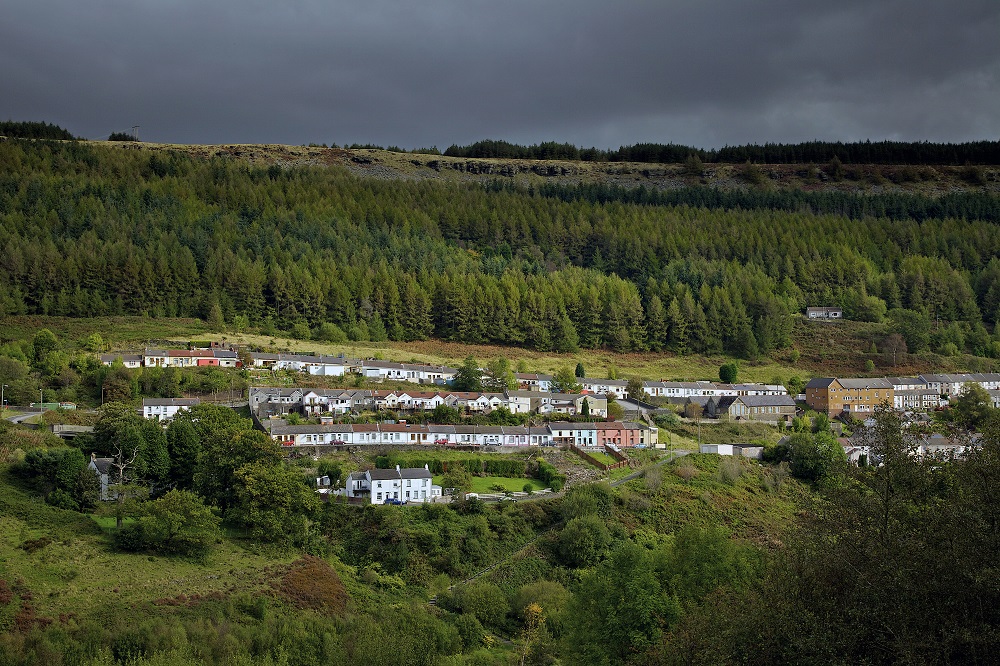Part four: The Great Welsh Auntie Novel by John Geraint

Nation.Cymru is delighted to publish the fourth part of documentary maker-turned-novelist John Geraint’s seriously playful “Great Welsh Auntie Novel” along with a reading by the author.
John Geraint
So far, we’ve been following 17-year-old Jac on a bus journey up the Rhondda on Election Night, February, 1974; and hearing about the lives, loves and qualms of his schoolmates, ‘The Society Of Friends’. Now, there’s a sudden change of time and tone…
The trouble with what I’ve written so far is that it reads too much like a novel.
It is a novel, I know that, and you know that.
But for the next couple of hundred pages – if I ever get that far – we have to pretend that it isn’t.
That it’s not a tale of some invented characters in a fictionalised version of the Valleys in the 1970s; not that, but instead a window on the real world, a direct, truthful rendering of the lives and struggles of some real people – what they really thought, what they really did, what they really felt.
That’s the strange compact we’ve made with this novel, as we do with every novel; me as a writer, you as a reader.
We know that it’s a constructed narrative: artificial, fabricated, a well-designed escape from the world we live in.
But we have to pretend to forget that, so that it feels natural, flowing in random, unresolved directions like our everyday experience.
I mean, when did you last notice the plot of real life?
And the problem is that if this reads like a standard work of fiction – which, if I may break a confidence, is entirely the way my editor is trying to push it – then it’s just wrong.
Fleeting days
Look, this is an autobiographical coming-of-age novel: the story of a gang of intense, bright teenagers, burning with idealism, learning to come to terms with realism.
How they lose a whole world and gain their own souls (or will it be the other way round?).
How for one brief season, they were in the right place at the right time, and sensed in those fleeting days… well, if not a way of living, nor quite a set of values that was close to what humanity has always been searching for, then at least the ghost of an idea that it wasn’t futile to hope for such a thing, or that the pattern for it might not once have been laid down here, in the very place where their stories were beginning.
But if this fiction is at all successful in persuading you that it actually happened this way; if, by the effort I’m expending to drag events up from the dim-and-distant past, to find and shape a beginning, middle and end, a satisfying narrative structure; if, by any or all of that, it becomes convincing… then it’s just peddling a falsehood, deceiving you into believing it was as neat, as contained, as clear-cut as that.
Because the truth is, the coming-of-age is taking a lifetime.
The change, growth, character development that’s necessary for any story (or so my editor insists) never happened as quickly, as unambiguously, or in anything like the way I’m being asked to set it down here.
It hasn’t really happened even now, as I’m writing it all up, half-a-century later.
Deceptions
This story of a sensitive young boy growing up is, in fact, written by an over-sensitive boy who never grew up, who still needs reminding that isn’t all about him, who stubbornly clings in defiance of all the evidence to a view of the Rhondda that’s hopelessly starry-eyed, a bigging-up of his little world as it never was, and certainly isn’t now, Oes Aur a fu, na fu erioed, a Golden Age that never really happened.
So the more successful it is as a piece of writing, the more it reads like one of those perfectly ordinary, perfectly structured romances where everything’s resolved just before the end of the penultimate chapter, the less it will have to say that’s useful about the real history it purports to describe, and the more profound will be its failure as an act of truth-telling.
That’s the big picture.
Getting the writing to work at a granular level also involves deceptions.
Compromises. Omissions.
Making it readable involves discarding so much about what these characters have experienced, a myriad of seemingly-inconsequential details that nevertheless colours their way of thinking.
Take those phrases from the chapter you’ve just read, where ‘Jac’ imagines himself ‘moving with the tide of history, ready and willing to break himself on the mole of that police line…’.
It’s slightly overwritten anyway, but that maritime metaphor leaping to the mind of a boy from the Coalfield may have struck you as slightly odd.
Would he actually have known and used the word ‘mole’ to mean a sea-wall?
But what if I told you that a hundred yards from the old Scotch Colliery on Llwynypia Road is the headquarters of the Rhondda Sea Cadets? Sea Cadets? In the Rhondda?
Improbable, but true (we’ll come to the Improbability Principle later; probably).
And that in The Onedin Line, Series 3, Episode 13, which ‘Jac’ would have seen on BBC1 just a month before, ‘mole’ is used in this exact sense no less than seven times.
More goes into writing a novel than you might think, and a lot more is left out.
There are no great writers, just great editors (or so my editor says).
Unnatural foresight
There’s another pitfall inherent in writing about the past.
Less important, but perhaps more annoying: the temptation to credit my protagonist with unnatural foresight, with the gift of prophecy.
Consider again the way that last chapter ended… ‘Why should stardom be the domain of the naturally gifted? One day, maybe soon, music will be democratised, and virtuosity won’t count for so much.’
Such a precise and prescient description of punk, and the way it turned the world upside down.
Really? Did anyone in the Rhondda in 1974 see Johnny Rotten and his Pistols coming?
Not me. Nor any of my friends.
So it’s a pretty cheap trick to suggest that ‘Jac’ did.
Sorry.
Now you’re forewarned, you’ll be on the look-out for such ruses from now on: don’t trust me, any more than you would trust an ad that pops up on your Facebook timeline.
It might be worth reminding yourself, though, before you get too het up, that as far ‘Jac’ and his friends are concerned, you are blessed – or cursed – with an astonishing degree of unnatural foresight.
You know precisely how their world is going to turn out.
Not in the small details of their lives, but certainly in what really matters: in the kind of politics and society that will emerge in the decades they’ve yet to see unfold, in what will happen to the hopes and dreams they cherish in their youthful idealism.
You know about Thatcherism and Aids, the Miners’ Strike of 1984-5, the Fall of the Wall and the Gulf Wars, Personal Computers, the Internet, Smartphones, Climate Change, Covid, Putin.
So, please, cut them – and me – some slack: in their naïve eyes, you’re possessed of God-like foreknowledge.

Biblical
And, if my editor will let me lighten up for a moment before we go on, I’ll mention one last difficulty I have in writing this novel: it’s so wet.
Buckets and stair-rods, cats and dogs, cloudbursts, torrents, deluges: Rhondda’s rain is biblical.
It’s a wonder there aren’t more people here christened Noah.
Tipping down, teeming down, pelting down, pissing down – you could write a book about it.
If you could stay dry long enough.
And that’s what this book is, I suppose: the wettest novel on record.
Makes Wuthering Heights read like one of those Mediterranean beach romances that ‘Jac’ imagined that his ‘Auntie’ must be engrossed in, all those times she went quiet on him.
Now, in all things but her reading habits, this ‘Auntie’ – who you haven’t really met yet – was one remarkable woman (or rather, as we shall see, fifty-one remarkable women. And one man).
But her role in this coming-of-age story, to the extent that is a coming-of-age story, was never anything like what I’ll shortly suggest it was.
I’m not kidding you about the rainfall though…
The Great Welsh Auntie Novel by John Geraint is published by Cambria Books and you can buy a copy here or in good bookshops.
You can catch up on previous extracts here. We’ll have another exclusive extract next week.
Support our Nation today
For the price of a cup of coffee a month you can help us create an independent, not-for-profit, national news service for the people of Wales, by the people of Wales.





